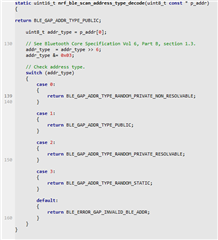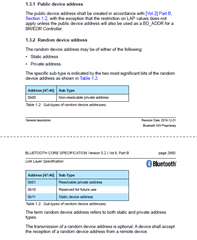I'm trying to connect to a device with a public address using an address filter in the scan (not whitelisting), I've seen plenty of similar unresolved issues posted here. So this is my take;
nrf_ble_scan_filter_set(&m_scan, SCAN_ADDR_FILTER, m_target_periph_addr.addr);
eventually gets to:
// Decode address type.
addr_type = nrf_ble_scan_address_type_decode(temp_addr);
which attempts to decode the type from the given address itself, from what I can tell this will only work with non-public (or random) addresses, my reading of the bluetooth spec may be wrong, however...

also states:
// See Bluetooth Core Specification Vol 6, Part B, section 1.3.
yet, again from what I can tell it does not follow this:

I can force the address type in the code above and have success, otherwise it decodes incorrectly, and given the match needs to occur on both address and type it fails.
So I guess my question is has anyone (SDK16 or other) successfully used an address filter (ie. a single filter or match all with some combo) to scan for a public address? Am I missing something? or is this actually an issue with the lib?


